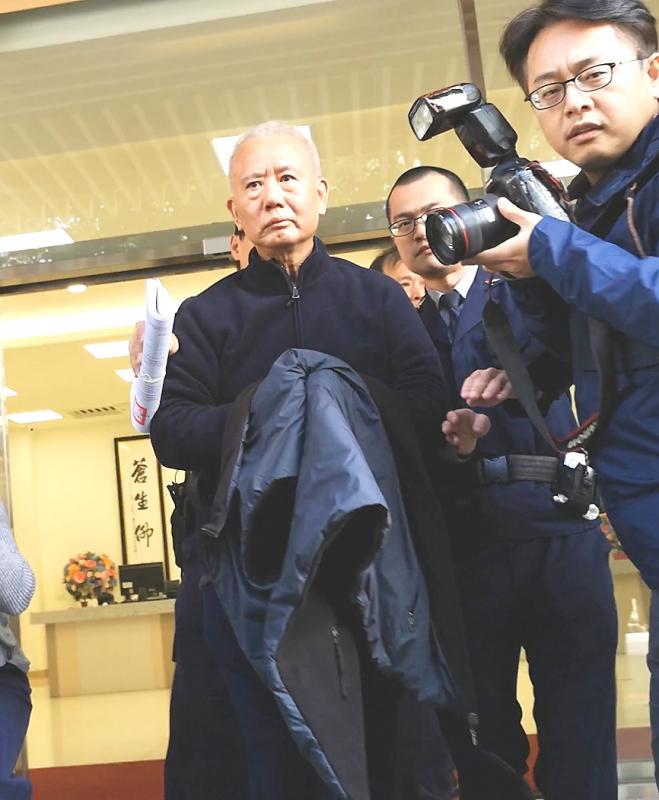Former Ting Hsin International Group (頂新集團) executive Wei Ying-chun (魏應充) was yesterday sentenced to more than nine years in prison for his role in a 2014 cooking oil scandal, with the Supreme Court saying that his actions had severely undermined food safety in Taiwan.
The court in a retrial convicted Wei for contravening the Act Governing Food Safety and Sanitation (食品安全衛生管理法) and fraud offenses in the Criminal Code.
It was the final verdict and cannot be appealed.

Photo: Huang Chieh, Taipei Times
The judges found Wei guilty on 39 counts leading to a combined sentence of nine years and two months. Nineteen counts, accounting for four years and four months of the total, can be commuted to a fine, calculated at NT$1,000 per day of jail time.
The four years and 10 months from the other 20 counts cannot be commuted, meaning Wei must serve that time behind bars.
The sentence means Wei is to be imprisoned for a third time for separate prosecutions for his role in the cooking oil scandal.
Judges yesterday also fined Ting Hsin International NT$105 million (US$3.51 million) and confiscated NT$74.68 million deemed to be illegal profits from sales of tainted cooking oil.
“The judges found that Wei had abandoned the social responsibility of the corporation by disregarding possible damage to consumers’ health,” the court said. “He purchased materials unfit for human consumption that went into the manufacturing process, producing adulterated cooking oil products for sale.”
“The products severely undermined food safety and contravened the rights of consumers,” the court said. “It also led to financial losses for downstream companies who believed Ting Hsin’s claims about its products.”
“Consumers had grievances and returned items they purchased,” it said, adding that the case has led to a “serious loss of trust in food safety in Taiwan.”
Wei is the third-eldest of four brothers who owned Ting Hsin International.
He previously headed subsidiaries Ting Hsin Oil and Fat Industrial Co (頂新製油實業), Cheng I Food Co (正義股份) and Wei Chuan Foods Corp (味全食品工業).
In 2014, prosecutors said that Wei and other company executives had instructed that animal feed-grade material from Vietnamese firm Dai Hanh Phuc Co be imported.
Investigators said that Wei had looked to cut costs by changing the formulas for 14 blended oil products his companies produced, including one falsely marketed as a premium class of blended oil that was actually 98 percent cheap palm oil and only 1 or 2 percent olive or grape-seed oil.
The scandal created a food-safety furor and led to class-action lawsuits against Ting Hsin companies.
Wei’s first conviction was for breaches of food safety rules and fraud, with the Intellectual Property Court in April 2017 handing him a two-year term, of which he served just over 500 days before being paroled in December 2018.
In a separate prosecution, which Wei’s lawyers appealed to the Supreme Court, he served 12 months in Taipei Prison of a four year and eight month sentence.
He was paroled in January last year.

Taiwan is stepping up plans to create self-sufficient supply chains for combat drones and increase foreign orders from the US to counter China’s numerical superiority, a defense official said on Saturday. Commenting on condition of anonymity, the official said the nation’s armed forces are in agreement with US Admiral Samuel Paparo’s assessment that Taiwan’s military must be prepared to turn the nation’s waters into a “hellscape” for the Chinese People’s Liberation Army (PLA). Paparo, the commander of the US Indo-Pacific Command, reiterated the concept during a Congressional hearing in Washington on Wednesday. He first coined the term in a security conference last

Prosecutors today declined to say who was questioned regarding alleged forgery on petitions to recall Democratic Progressive Party (DPP) legislators, after Chinese-language media earlier reported that members of the Chinese Nationalist Party (KMT) Youth League were brought in for questioning. The Ministry of Justice Investigation Bureau confirmed that two people had been questioned, but did not disclose any further information about the ongoing investigation. KMT Youth League members Lee Hsiao-liang (李孝亮) and Liu Szu-yin (劉思吟) — who are leading the effort to recall DPP caucus chief executive Rosalia Wu (吳思瑤) and Legislator Wu Pei-yi (吳沛憶) — both posted on Facebook saying: “I

The Ministry of Economic Affairs has fined Taobao NT$1.2 million (US$36,912) for advertisements that exceed its approved business scope, requiring the Chinese e-commerce platform to make corrections in the first half of this year or its license may be revoked. Lawmakers have called for stricter enforcement of Chinese e-commerce platforms and measures to prevent China from laundering its goods through Taiwan in response to US President Donald Trump’s heavy tariffs on China. The Legislative Yuan’s Finance Committee met today to discuss policies to prevent China from dumping goods in Taiwan, inviting government agencies to report. Democratic Progressive Party Legislator Kuo Kuo-wen (郭國文) said

Sung Chien-liang (宋建樑), who led efforts to recall Democratic Progressive Party (DPP) Legislator Lee Kun-cheng (李坤城), was released on bail of NT$80,000 today amid outcry over his decision to wear a Nazi armband to questioning the night before. Sung arrived at the New Taipei District Prosecutors’ Office for questioning in a recall petition forgery case last night wearing a red armband bearing a swastika, carrying a copy of Adolf Hitler’s Mein Kampf and giving a Nazi salute. Sung left the building at 1:15am without the armband and covering the book with his coat. Lee said today that this is a serious